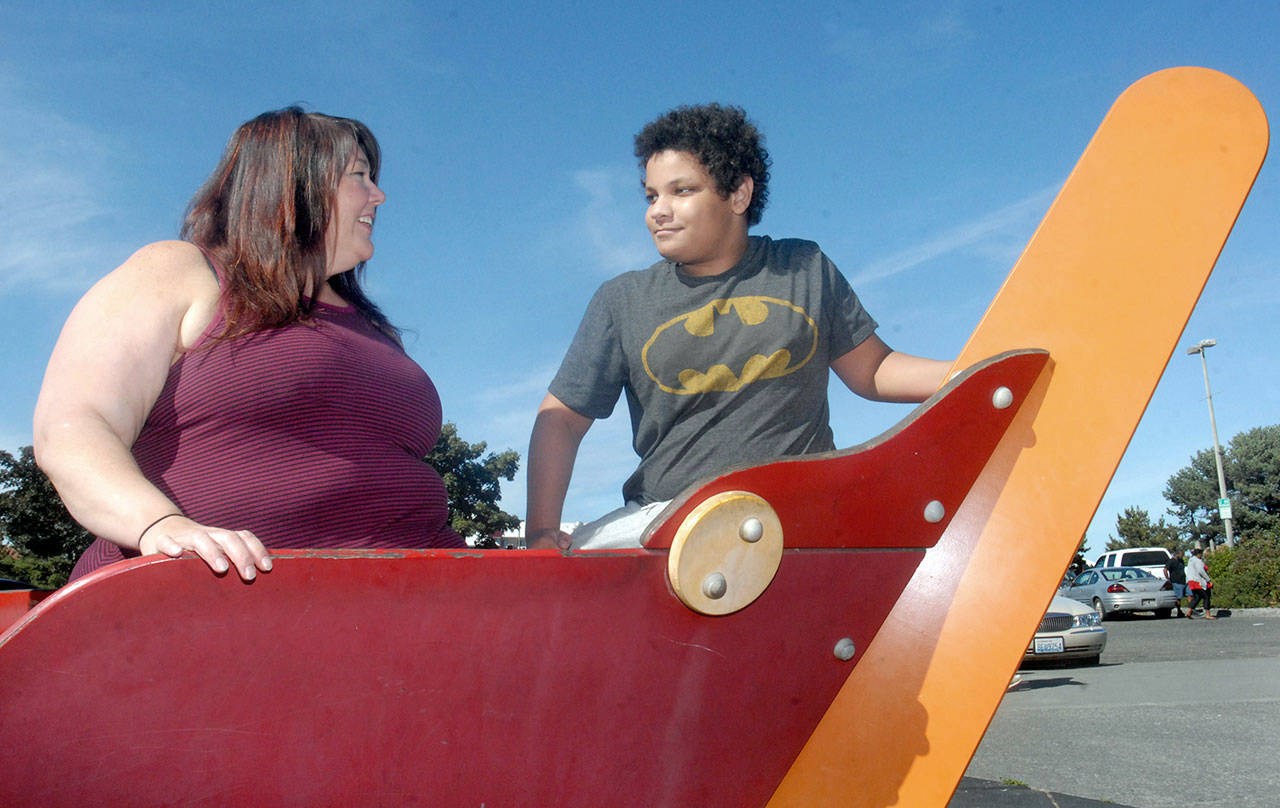PORT ANGELES — From the subject line, the email appeared to be soliciting donations.
Then, Tiffany Sudela-Junker of Port Angeles received another with the same heading and thought, “I should probably open this.”
One click revealed a message from the Congressional Coalition on Adoption Institute in Washington, D.C., and Sen. Patty Murray’s office informing Sudela-Junker that she had received one of the 2017 Angels in Adoption awards honoring individuals whose work in adoption or foster care has made a national impact.
“I was totally shocked,” she said.
Sudela-Junker’s husband, Jason Junker, on the other hand, experienced feelings on the other end of the spectrum.
“Anybody who knows her shouldn’t be surprised,” Junker wrote in a public Facebook post. “It’s a little like living with Wonder Woman. I just take it for granted that she’s off doing something amazing and saving the planet with her Lasso of Truth and Invisible Plane.”
The heart of Sudela-Junker’s film, community, national and personal work centers on helping children who experience early trauma.
She serves on the board of directors of the national organization Attachment &Trauma Network (ATN); sits on the leadership committee of Kitsap Strong, a nonprofit in Kitsap County that aims to prevent ACEs (Adverse Childhood Experiences); and produced the film “My Name Is Faith” in 2012, which explored the impacts of trauma in her daughter’s life.
She’s also the mother of two “brilliant and hilarious” teenagers, Faith, 18, and Jonah, 13, whom she and her husband adopted in 2012.
Past Angels in Adoptions awardees include a number of celebrities and public figures, such as Laura Bush, Rosie O’Donnell, Bruce Willis, Muhammad Ali, Jane Seymour and Henry Winkler. Among this year’s 150 honorees representing every state, Olympic figure skater Scott Hamilton made the list.
In the email announcement, Murray wrote, “Tiffany Sudela-Junker of Silverdale [now Port Angeles] especially stood out with her incredible personal story and the work she has done with other children and families in her community.”
“I started tearing up when I read that,” Sudela-Junker said.
Sudela-Junker, Jason Junker and Jonah (Faith cannot attend) will head to Washington, D.C., next week for a ceremony and three days of events from Monday to Wednesday, Sept. 27.
On Tuesday, members of Congress will present each Angel with a pin and certificate, and on Sept. 27, or “Hill Day,” Angels will meet with legislators to advocate for issues related to adoption or foster care.
Sudela-Junker plans to talk about trauma-sensitive schools, she said.
Trauma-sensitive schools, sometimes also called trauma-informed schools, aim to make children feel safe and allow them to thrive rather than simply survive the system, she explained.
“There’s a lot of nuance [in teaching and caring for a child who has experienced trauma],” she said.
To show this nuance, she likes to share the story of Jonah’s first day of kindergarten.
Sudela-Junker had everything meticulously prepared in anticipation, down to the shoes. Just one small unplanned detail would await them on the Big Day.
When they arrived at the elementary school, Sudela-Junker was told she could not walk Jonah into his classroom. A security measure at the Texas school prevented parents from venturing beyond a desk with a sign-in sheet. She tried to subtly hint that it would be best for Jonah if she could walk through.
Observing the argument, 5-year-old Jonah sweetly said, “Mom, did you tell them about my twauma?”
Sudela-Junker explained that a trauma-sensitive school would recognize that visible security measures aimed to make children feel safe can cause the opposite effect for youths with trauma-based needs.
Such a school would also forgo the flurry of “Where did your name come from?” projects she saw throughout her Faith’s elementary years. This disadvantages children who don’t know their birth parents or where their name came from, she explained.
Although a means of distinguishing schools as “trauma-sensitive” has not yet come to fruition, Sudela-Junker said ATN has been discussing a stamp of approval and currently provides professional development training in schools.
She also emphasized trauma-supported care benefits all children, rather than one segment of the school population alone.
Sudela-Junker likes to imagine what life would look like if children with ACEs had all their needs met by schools, the community and caretakers.
To this end, she will produce another film depicting youths ages 12 to 14 who can receive this kind of support through a summer program. Currently, she’s in the stage of preproduction, she said.
While she hasn’t yet firmed up the location, she is eyeing Port Angeles.
“I hope it can be here,” she said.
The idea for the film grew out of the friendship between Jonah and a man named Ben.
The Junker family met Ben while paddleboarding on Father’s Day. Ben got along naturally well with Jonah, so Sudela-Junker asked if she could pay him to go on “adventures” with Jonah once a month, she said.
They’ve been adventuring together ever since. Kayaking. Biking. Bowling. Going to the beach. Visiting the Seattle Aquarium.
“And he did it for years without ever accepting a penny,” she said.
Ben and Jonah inspired Sudela-Junker to explore how these types of connections would impact other children who experienced early trauma, she said.
Trauma, she notes, leaves a lasting imprint.
“Trauma is complex and impacts the body and spirit in profound ways,” she said.
For parents seeking resources for traumatized children, Sudela-Junker suggested joining ATN. An annual individual basic membership is free. The Centers for Disease Control and Prevention also includes a list of ACEs resources on its website.
________
Reporter Sarah Sharp can be reached at 360-452-2345, ext. 56650, or at ssharp@peninsuladailynews.com.

